With the recent announcement of the Centre for Effective Altruism on leaning into cause-specific conferences for some of their events, EAs working in farmed animal welfare or alternative protein lost an important event to network, hear about the latest research, and meet EA-minded funders.
We often get asked: “Is the AVA Summit an EA event?” and I would like to provide some answers and thoughts about that in this post.
First and foremost, the AVA Summit is an international conference series bringing together advocates focusing on systemic change for animals. The animal and vegan advocacy movement consists of people working on a wide range of strategies and approaches, but we all share a vision of a world where nonhuman animals, ultimately, are taken out of the food system and other human uses.
While the AVA Summit is not branded as an EA event, there are certain “EA lenses” that we frequently use in our assessments and work, such as the core principles around scalability, tractability, and neglectedness:
- We emphasize topics relating to systemic change, e.g., changing corporate policy or legal protection.
- We focus on farmed animals (including aquatic animals and insects), as well as on wild animals, suffering in large numbers.
- We are committed to inspiring our participants to be as impactful as possible in the work they are doing for animals, which also means inspiring them to continuously reconsider, improve, and update.
To be very clear and transparent, I will add to points 1. and 2.:
- Additionally, we welcome other tactics and strategies to be discussed in an atmosphere of mutual respect.
- Additionally, other areas of animal exploitation, like experimentation, do also have a place at the AVA Summit.
Who attends the AVA Summit?
Our attendees are dedicated individuals working or looking to work in the animal and vegan advocacy movement professionally. 80% of our attendees are full-time advocates.
Lewis Bollard, Farm Animal Welfare Program Director at Open Philanthropy, said about the inaugural AVA Summit that it was “the event with the highest number of serious-minded people in the movement“. We strive to achieve this high standard with all of our events.
Our events are also substantially more international than any other similar event: At the last Summit in the US, we welcomed more than 750 attendees from 47 different countries.
People at AVA have a multitude of motivations, including animal welfare, animal rights, environmental, social justice, effective altruism, public health, and they also join from other intersecting movements. A lot of attendees at AVA are EA-aligned without necessarily calling themselves “Effective Altruists”.
What are the biggest advantages of going to the AVA Summit?
- Having conversations that are directly related to your work in animal advocacy and learning about actionable strategies, as well as benefiting from lessons and collaborations in EA-adjacent movements.
- Finding hidden counterfactual talent in a different pool of potential applicants, and networking with a highly diverse and highly international audience.
- Meeting with a large number of farmed animal funders, as well as nonprofits. At the last Summit in the US, 215 organizations working directly in the movement were represented (not counting universities, companies, etc.).
What is the program at the AVA Summit like?
Like I mentioned before, we support various strategies and tactics for advancing our shared vision: From grassroots activism to highly specialized engagement, individual outreach to food systems change, legislative change, corporate engagement, advancing animal-free technologies, as well as non-animal issues stemming from animal farming (such as climate change and farmworker abuse), and issues facing our movement (such as promoting racial and gender equality).
Our program is about improving the impact and effectiveness of what advocates do more than excluding certain tactics or trying to convince someone out of their tactic of choice: We don’t offer a blanket condemnation nor approval of tactics.
Check out the speaker lineups from our past events here!
We work with our Advisory Committees to create the best possible program for our audience. At the same time, we know that one single event cannot satisfy everyone, and we are happy that there are many other wonderful events with slightly different angles and approaches.
How is AVA generating impact?
We put emphasis on a detailed evaluation of our work and we set ourselves ambitious quantitative and qualitative goals for each event that we measure via collecting data in our registration forms, conducting surveys, and gathering feedback in anonymous feedback forms. There are various ways in which the AVA Summit adds significant value:
People:
- Show activists and newcomers how they can use their skills to the best use for the cause
- Train seasoned advocates to become even more impactful and evidence-minded
- Help existing and new donors to identify and support the most promising projects
Organizations:
- Give organizations the opportunity to find highly skilled employees and volunteers
- Build bridges and strengthen ties between the participating organizations
- Facilitate the creation of new initiatives, collaborations, and organizations
Movement:
- Create a learning culture within our movement and reduce the risk of infighting
- Further professionalize our movement with a modern flagship conference
- Improve the outside perception of our movement, e.g. in mainstream media
Come join us and let us know what you think:
We welcome the participation of “effective animal advocates” at all of our events, especially those engaging in or interested in full-time work in the field. And of course, we welcome your honest feedback!
Upcoming events in 2024
- AVA Summit US – May 16-19, 2024 in Washington DC
- Asia Farm Animal Day (co-organized with Asia for Animals) – October 9-11, 2024 in Vietnam
- AVA Summit Brazil – Early December, 2024 in São Paulo
Useful links
Our website: www.avasummit.com
Subscribe to our monthly newsletter and follow us on LinkedIn | Instagram | Facebook | Twitter



